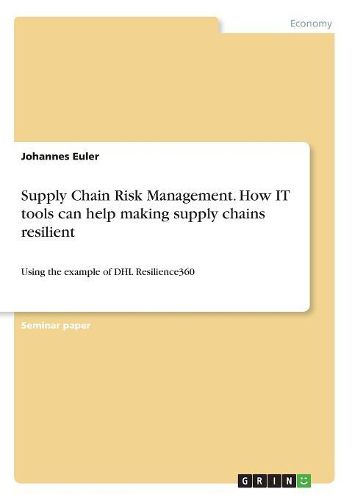Readings Newsletter
Become a Readings Member to make your shopping experience even easier.
Sign in or sign up for free!
You’re not far away from qualifying for FREE standard shipping within Australia
You’ve qualified for FREE standard shipping within Australia
The cart is loading…






Seminar paper from the year 2017 in the subject Business economics - Supply, Production, Logistics, grade: 1,0, Reutlingen University, language: English, abstract: Driven by a high intensity of competition, modern companies have put much effort into reducing costs in their supply chain. Two important trends on the way to achieving that goal are globalization and lean management. Both have led to complex, highly distributed supply chains and low buffer stocks. Indeed, these mechanisms brought lower costs but at the same time an increase of vulnerability and risk in modern supply chains. Unexpected disruptions in supply chains can cause a huge impact on businesses, such as high financial expenses and supply delays on the short-term, but also negative brand reputation and falling investor confidence on the long-term. This is why the implementation of the approaches supply chain risk management (SCRM) and business continuity management (BCM) has become crucial in the sphere of top-level management. Digitization is another disruptive trend within the present economic system. The volume of available data for businesses has been increasing exponentially in the last years. But at the same time most companies have failed using these data, essential in decision-making process. These unused data offer great potential: With Big Data Analytics they could turn companies’ supply chain risks into a competitive advantage. This case study deals, in virtue of the quote from JFK, with the research question: How can IT tools support companies making their supply chains resilient? To this effect, the first chapter describes key risks in modern supply chain in order to create a general awareness of the scope of SCRM and BCM approaches. The next chapter then compares two common supply chain strategies with a focus on resilience in order to evaluate the proposed solution at the end of this case study. Thereupon Chapter 4 answers the research question of this case study by comprisi
$9.00 standard shipping within Australia
FREE standard shipping within Australia for orders over $100.00
Express & International shipping calculated at checkout
Seminar paper from the year 2017 in the subject Business economics - Supply, Production, Logistics, grade: 1,0, Reutlingen University, language: English, abstract: Driven by a high intensity of competition, modern companies have put much effort into reducing costs in their supply chain. Two important trends on the way to achieving that goal are globalization and lean management. Both have led to complex, highly distributed supply chains and low buffer stocks. Indeed, these mechanisms brought lower costs but at the same time an increase of vulnerability and risk in modern supply chains. Unexpected disruptions in supply chains can cause a huge impact on businesses, such as high financial expenses and supply delays on the short-term, but also negative brand reputation and falling investor confidence on the long-term. This is why the implementation of the approaches supply chain risk management (SCRM) and business continuity management (BCM) has become crucial in the sphere of top-level management. Digitization is another disruptive trend within the present economic system. The volume of available data for businesses has been increasing exponentially in the last years. But at the same time most companies have failed using these data, essential in decision-making process. These unused data offer great potential: With Big Data Analytics they could turn companies’ supply chain risks into a competitive advantage. This case study deals, in virtue of the quote from JFK, with the research question: How can IT tools support companies making their supply chains resilient? To this effect, the first chapter describes key risks in modern supply chain in order to create a general awareness of the scope of SCRM and BCM approaches. The next chapter then compares two common supply chain strategies with a focus on resilience in order to evaluate the proposed solution at the end of this case study. Thereupon Chapter 4 answers the research question of this case study by comprisi